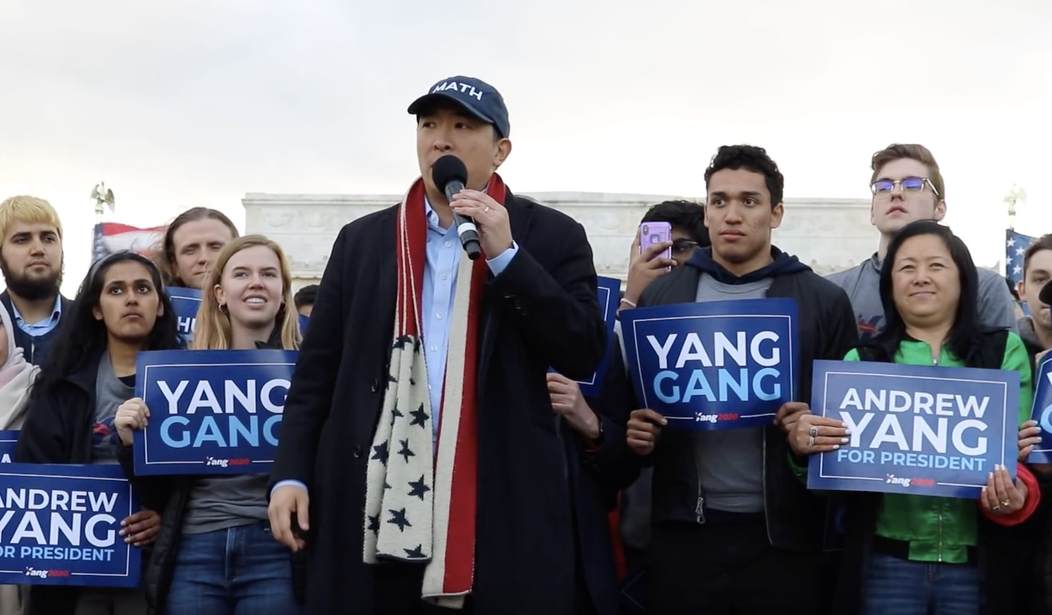Since the 1970s, it’s been the dream of big government liberals to give poor Americans a guaranteed basic income. The amount has varied over the years, as have the conditions. Some proponents of the idea want to give what amounts to the median family income in lieu of benefits like housing and food assistance. Others want the income to be given in addition to those government benefits.
Democratic presidential candidate Andrew Yang has actually made the guaranteed basic income his primary campaign issue. Yang calls it a “Freedom Dividend” for everyone.
In the next 12 years, 1 out of 3 American workers are at risk of losing their jobs to new technologies—and unlike with previous waves of automation, this time new jobs will not appear quickly enough in large enough numbers to make up for it. To avoid an unprecedented crisis, we’re going to have to find a new solution, unlike anything we’ve done before. It all begins with the Freedom Dividend, a universal basic income for all American adults, no strings attached – a foundation on which a stable, prosperous, and just society can be built.
It would be funded with a combination of a value-added tax and consolidation of some other welfare benefits. Yang estimates the VAT will generate about $800 billion in revenue. The key is every adult in America would receive the benefit. And, of course, employment would not be required.
One European country tried a guaranteed basic income with mixed results. For two years, Finland was giving about 2000 people around 560 euros a month. A study done after the experiment was over showed that the recipients were happier, but the program did not lead to an increase in employment.
Yang is not alone in his prediction. No one knows how artificial intelligence will impact the workplace. But it’s reasonable to assume there will be some disruptions. Yang appears too eager to reject the idea that new jobs will appear at a fast enough rate. This is the great unknown, which is why the idea of a universal basic income has attracted some support — even on the right.
Stockton, Calif., is one of the first American cities to experiment with a UBI, although it’s funded and run by a private charity. The idea is that 125 people are getting $500 a month, no strings attached, to spend as they wish. Strangely, the goal isn’t to give people money as much as it is to make the “happy.”
- Stockton residents, who have elected Republican mayors for 16 out of the last 22 years, were skeptical, worried about encouraging people not to work. Tubbs said he calmed their fears by noting the money came from private donations, not taxpayer dollars.
- A team of researchers is monitoring the participants. Their chief interest is not finances but happiness. They are using what they call a “mattering scale” to measure how much people feel like they matter to society.
- The money has made Jovan Bravo happier. The 31-year-old Stockton native and construction worker is married and has three children, ages 13, 8, and 4. He says he didn’t see enough of his children when he worked six days a week to pay the bills. That changed when he started getting $500 a month. Now he only works one Saturday a month. He uses the other Saturdays to take his kids to the amusement park and ride bikes with them in the park. “It’s made a huge difference,” he says. “Just being able to spend more time with the wife and kids, it brings us closer together.
I don’t think there’s any doubt that there is a severe moral hazard in giving out free money. Andrew Yang’s idea at least has the virtue that everyone in America would benefit. Other proposals would single out “the poor” for this extra income.
Unless human nature changes in the near future, people will no doubt be “happier” getting something for nothing, but where would the benefit to society be? Making work optional doesn’t make any sense when the money used to buy this “happiness” comes from those who work for a living.
We shouldn’t close our minds entirely to the UBI. Some form of it may be a way to empower people on public assistance and save some taxpayer money. But Andrew Yang’s idea and the Stockton experiment are not the way to address the problem of poverty today or unemployment tomorrow.










Join the conversation as a VIP Member